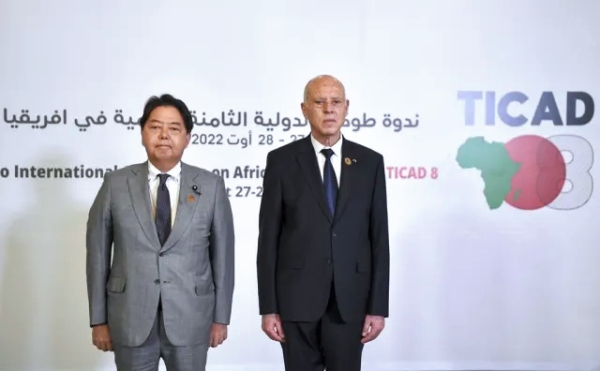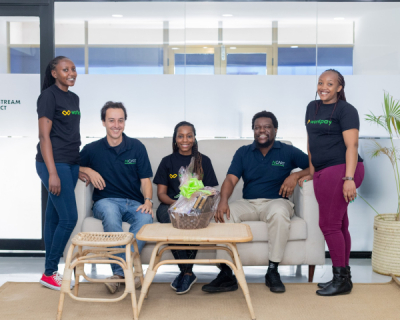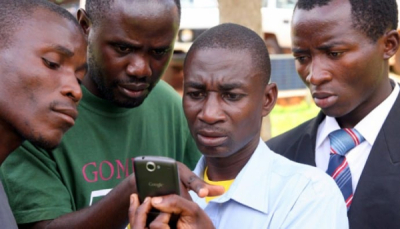Recently, the e-commerce boom gave a new impetus to a concept that started in the 1970s: dropshipping. Although the popularity of that concept is growing among Africans, there is almost no local platform facilitating the process. Tendo is changing that.
Tendo is a digital platform developed by a Ghanaian eponymous startup, connecting local suppliers with dropshippers. Before Tendo, “people who want to sell online [had] to save money, visit hundreds of suppliers to find a trusted one, and risk losing their capital by stocking up inventory. [They also had] to incur costs for logistics and warehousing,” explained co-founder Felix Manford. With the creation of the startup Tendo (in 2020), all that changed, he added.
The solution addresses additional challenges, allowing any individual who so wishes to become a retailer. "Tendo enables anyone to start their online business without investing any capital," the platform indicates. All the retailers have to do is share the goods listed by suppliers with potential customers. When a buyer places an order with the retailer, the latter simply sends the order and buyer’s details and lets the supplier deliver the order. Once the order is delivered, the retailer will receive the profit he/she generated.
Tendo also has a mobile app (accessible for Android and iOS devices) that allows users to perform all the tasks they can carry out on the web platform. It also allows suppliers to register on Tendo and leverage the retailer network to quickly sell their goods.
From 2020 to date, the Ghanaian startup behind the platform has raised over US$220,000. This year, it expanded into the Nigerian market and got selected to participate in Y Combinator’s winter cohort.
Adoni Conrad Quenum
The African Digital Hub aims to take advantage of Tunisia’s geographical and geo-digital positioning to create a global digital hub.
During the TICAD 8, held in Tunisia last August 27-28, volunteer organization Tunisian Smart Cities (TSC) presented African Digital Hub, a pan-African project aimed at connecting Africa to the world.
According to the TICAD 8 whitebook published by the Tunisian-Japanese chamber of commerce and industry, the digital infrastructure offers an opportunity to establish a set of digital cardinals on the African continent, ensuring “the inter-connection of Africa with the rest of the world through a sovereign mesh of submarine cables.”
For Akil Sadkaoui, manager of the African Digital Hub project, the infrastructure will help boost connectivity in Africa, “therefore allowing residents to capitalize on new value chains in a context marked by growing e-commerce and mobile payment activities at a time when artificial intelligence, cryptocurrencies and soon quantum networks are constant discussion topics.”
The African Digital Hub will be implemented following a public-private partnership model. During its first phase (US$307 million), Green's Data Cities will be built, forming the building block of a large backbone network that will benefit allied cities.
The project is expected to create some 500 direct jobs. It aims to create a green digital sector that leverages green energy sources and an academic research program. For connectivity expert Damien Bertrand, thanks to the African Digital Hub, Tunisia could become the northern gateway of a sovereign and autonomous Africa while Bizerte will be the building block of that gateway.
Let’s note that the Bizerte governorate (in Tunisia) and the African Development Bank (AfDB) have already launched the feasibility study of the first phase of the African Digital Hub.
Samira Njoya
The solution was developed to help SMEs save resources and time by outsourcing some of their management chores.
Workpay is a digital solution developed by an eponymous Kenyan startup. It allows African SMEs to hire, manage and pay their employees. The startup, which developed the platform, was founded in 2019 by Jackson Kibigo and Paul Kimani. From its inception to date, it raised over US$2.4 million to support its African growth
According to co-founder Paul Kimani, the funds raised have provided an opportunity for Workpay to scale its “human resource management and payroll processing tools to SMBs and expand to enterprise clients across East Africa.”
“We are fortunate to have the backing of some incredible people on our mission to make it easy for businesses to manage and pay employees across Africa,” he added.
The digital solution has a mobile app, accessible for Android and iOS devices. The mobile app allows users access to the various web services offered by Workpay and also allows them to monitor team performance in real-time and hire the best African talents.
To let subscribing companies enjoy their subscription to the fullest, Workpay’s pricing is dynamic and tailored according to every company's need. “We believe not all companies are the same. Therefore, our packages and pricing are different for each company,” the Kenyan startup indicates. On its website, it claims over 500 firms are using its solution, including Nigerian unicorn Flutterwave.
Adoni Conrad Quenum
Uganda has a high internet penetration rate. However, internet costs are still high, making the resource less affordable for many. The current plan to half the costs aims to make it more affordable.
The Ugandan government plans to reduce internet costs to promote the use of digital financial services and increase financial inclusion for vulnerable groups.
According to ICT Minister Chris Baryomunsi, the country will reduce the price of the data it provides through the national backbone by more than 50%, from US$70 per Mbps to US$30.
“We are talking about purely government internet. Once we cut down the cost at which government is selling to service providers, then they will automatically also reduce the cost that the end user will be paying and we think this will help in our efforts to digitize our economy,” he said last Wednesday.
By reducing internet costs, the country will support ICT innovation, and the development of digital financial services, communication, and e-government, among others. Several projects are underway to complement that measure. The most important of those projects is the National Data Backbone and e-Government Infrastructure project, with an estimated cost of US$75 million. It will connect the country’s major cities to a fiber optic network and connect ministries and administrations to the e-government platform.
The projects initiated are part of Uganda's Digital Acceleration Program, which aims to fill the current infrastructure gap and accelerate Internet penetration in the country.
Samira Njoya
From taking the risk of leaving a successful career at Coca-Cola for entrepreneurship to founding two successful fintech startups and selling one in an acclaimed deal, Hilda Moraa knows what it takes and how to achieve it. Some 12 years ago, after a few years of professional career, she decided to venture into entrepreneurship. Her two ventures were successful and she wants to help other Africans succeed by removing the main challenge that usually limits their efficiency: funding.
Kenyan entrepreneur Hilda Moraa is the founder of Pezesha, a fintech founded in 2016 to facilitate access to financial support for African SMEs. According to Moraa, financial aid helps SMEs improve their efficiency. That is why she launched her fintech, which connects fund seekers with investors (banks and financial institutions notably) through a digital financial marketplace.
“By resolving the issue of small and medium enterprises securing working capital and gaining a credit score, I believe we can equip business owners with assets so they can compete and trade on a national scale,” she told Google in Africa in March 2022.
In 2021, she was among the fifty recipients of Google’s Black Founders Fund Africa. Two years earlier, she was among the participants of the Obama Foundation’s Leaders program. This enhanced the leadership and innovation skills she acquired in the course of her professional and entrepreneurship career. Indeed, ten years earlier, in 2011, she founded WezaTele, a startup that uses data analytics to help last-mile businesses grow and scale their businesses. She remained the CEO of WezaTele till its acquisition by financial services group AFB (now Jumo World) in 2015.
The same year, she published her book, A Kenyan Startup Journey, sharing the key lessons she learned as the founder and CEO of WezaTele. In 2016, in recognition of her actions in favor of entrepreneurship, she was selected on The Guardian’s list of Africa’s top 10 pioneers, and Business Daily’s top 40 women that celebrate women who thrive in the tech sector. She also made it to Quartz Africa’s list of the top 30 African innovators. In 2019, she also received the DFS Lab’s Female Focused Fintech Prize.
The tech entrepreneur started her professional career in 2008 when she joined the IT company Techbiz as an IT intern in asset management and ERP implementation. The same year, she became coordinator of the Strathmore University computer lab. Then, in 2009, she was recruited, as a database analyst and innovation implementer, by Coca-Cola Kenya.
In 2011, Hilda Moraa became an innovation strategist and senior ICT researcher at iHub Nairobi. From 2017 to 2021, she was a board member of Station F, a startup campus based in Paris. Concurrently, in 2020, she served on Kenya's Covid-19 ICT and Innovations Advisory Committee established by the Ministry of ICT, Innovation, and Youth.
In June 2022, she was appointed a member of the Board of Directors of the Konza Technopolis Development Authority, whose mission is the development of a sustainable smart city and innovation ecosystem in Kenya.
Melchior Koba
The solution started in 2018 as an Instagram page offering educational assistance. It evolved to become the edtech platform, as it is known now, to allow students to help their peers in a quick and more conducive manner.
Stranerd is an edtech solution developed by a Nigerian startup Stranerd LLC, founded in 2021. It allows students to help themselves in various subjects by asking or answering course-related questions, with rewards for the best students who are most active on the platform.
"Our goal is to build the largest community of students where collaboration and innovation thrive, to create opportunities for the student to function at the highest level possible and bring the most value to the student community. We intend to do this by fostering peer-to-peer learning by giving students the tools to collaborate and solve their problems," said Stranerd LLC co-founder Jeremiah Godwin.
The solution is available as an Android-only mobile app. It helps students prepare for exams using flashcards and course notes and questions.
Through its gamified, sleek, and ergonomic interface, Stranerd encourages students to spend enough time on the app to better grasp course subjects. Peer-to-peer learning, as the startup calls it, is free on the platform. However, it is subject to registration (with a set of personal information). For those who wish for it, the startup also offers paid tutoring services and assignment assistance online.
In 2022, the startup, which started as an Instagram page offering educational assistance, was selected among the 45 participants that will take part in the second edition of the accelerator program Future of Work Africa.
Adoni Conrad Quenum
The digital transformation project underway in Congo will help the country address the numerous shortcomings of its education system and foster the development of a high-performance ecosystem.
Congo-Brazzaville disclosed Thursday (August 25), the key steps it will focus on to succeed in the digital transformation of its education system. The steps were presented by the Ministry of Pre-school, Primary and Secondary Education during a ceremony to validate the conclusions of the national consultations held on August 12-13 to discuss the transformation of the national education system.
The steps include training teachers on digital pedagogy, mastery of ICT tools, and distance learning management.
According to the United Nations, which is the government’s partner in the project, the ceremony held on August 25 helped identify the steps to take to build a stronger, more equitable, adaptable, and resilient education system.
"The United Nations, which is aware of the challenges facing the education system, reiterates its commitment to supporting countries in their bids to reorganize their education systems to achieve the fourth sustainable development goal,” said Chris Mburu, the UN resident coordinator in Congo.
In Congo, education is one of the sectors most affected by the coronavirus pandemic. Due to its poor readiness, the country’s education sector was disrupted with thousands of students being unable to continue classes since there were not enough technical and human resources to ensure continuity with distance learning.
The digital transformation project currently planned by Congolese authorities will safeguard the government’s ability to ensure education continuity in times of crisis that requires mobility restrictions. It will also allow students access to more educational resources.
Samira Njoya
Few years ago, the trained nurse entered the healtech sector with a solution that helps blood banks recruit donors. She later pivoted to focus on helping institutions and their likes find the right participants for their clinical trials in Africa. Her choices proved judicious as the startup has already won her several awards, testifying of the positive impacts she is having on the continent.
Melissa Bime (photo) is a Cameroonian nurse, tech entrepreneur, and co-founder of Infiuss Health, a “Unified Solution for Outsourced Clinical Research in Africa.”
Her startup was founded, in 2016, as an online blood bank aimed at reducing mortality induced by blood shortage. After a successful blood donation campaign, the startup partnered with several health centers in Cameroon and even earned several awards, including the 2018 Cartier Women's Initiative Awards (worth US$100,000) and the USAID Inclusive Access to Health Award.
In 2020, Melissa turned her startup into a clinical trial management company for hospitals, pharmaceutical companies, etc., in Africa.
“We are building highly study-specific and very flexible solutions that allow sponsors to find the right participants, sites, and primary investigators so that they can run fully remote, or hybrid, clinical research studies," Infiuss informs on its website.
“If you are a company working on a medical trial and trying to figure out how to diversify the participant cohorts, we are providing a cheaper alternative than recruiting in the United States,” Melissa explained in 2021.
In October 2021, she won the 43North Competition entitling her to a US$500,000 prize. In January 2022, she relocated her business to Buffalo, New York.
Melchior Koba
In Africa, most schools teach lessons in official languages. Practically no courses are taught in local languages. Yet, researches show that teaching courses in local languages can greatly improve academic performance. This partnership may be an interesting experience.
Last Wednesday, Premium content streaming platform Ckrowd and Nigeria's Center synergies in areas of education, technology, and the dissemination and advocacy of knowledge for the Advancement of Education "School on Air (SOA)" signed a memorandum of understanding to offer digital STEM courses in local Nigerian languages, including Yoruba, Igbo, Hausa, but also in French.
For Kayode Adebayo (photo, right), CEO of Ckrowd, the MoU is a starting point to "generate synergies in education, technology, dissemination, and advocacy.”
The initiative comes after research results showed that many Yoruba youth increased their knowledge retention in science, technology, engineering, and mathematics subjects by 65% when studying in their native language. The same is true for Hausa students whose knowledge retention increased by 250% after learning STEM in their native language.
The goal of this agreement is therefore to close the education gap on the African continent and provide opportunities that will help students gain the technical skills, professional knowledge, and attitude needed to excel and function globally with a comprehensive curriculum that will benefit the next generation.
According to stakeholders, the initiative will reach more than 40 million young Africans, particularly in West Africa. It will enable students from different backgrounds to access education, and learning opportunities to improve their livelihoods. Doing so will contribute to sustainable development goal number four which aims to “ensure inclusive and equitable quality education and promote lifelong learning opportunities for all.”
Kayode Adebayo explains that the MoU is just the beginning of numerous projects to improve the living conditions of “the next generations of young Africans.”
To fulfill that goal, Ckrowd intends to partner with various parties “to deliver true value to young Diasporans and Africans on the Continent” as well as create “unique and ad-hoc local solutions and innovation to advance African nations and harness the new dynamic of the digital age, content creation, technology, and education.”
Samira Njoya
Human resources are one of the key components for the success of every firm, organization, or institution. However, identifying the best professionals sometimes takes a huge amount of time. With his deep-leaning tool, Mouhidine Seiv shortens the curve.
Mouhidine Seiv (photo) is a Mauritanian entrepreneur and data scientist. In 2016, he founded HrFlow.ai (formerly known as Riminder.net.) to leverage artificial intelligence to help firms hire better human resources for improved efficiency.
HrFlow.ai allows "recruiters to identify three times more talent while interviewing four times fewer candidates by analyzing millions of resumes worldwide. We have developed deep learning algorithms to evaluate and classify every part of a candidate's profile: experience, projects, and education. This technique allows us to achieve unparalleled relevance," Mouhidine Seiv told French magazine Décideurs in 2017.
Beyond its recruitment assistance services, HrFlow.ai also assists companies and vendors in their General Data Protection Regulation, privacy regulations, algorithmic consent constraints, and fairness requirements compliance procedures.
From 2016 to date, through HrFlow.ai, Mouhidine Seiv has helped more than a hundred firms automate their human resources data management. The tech entrepreneur is a former visiting assistant professor of deep learning at CentraleSupélec, the graduate engineering school of Paris-Saclay University. In 2017, Leade.rs ranked him among the eight under-30 emerging entrepreneurs to watch in France. Some years later, he also made it to Forbes’ “30 under 30” list.
Melchior Koba
More...
There have always been debates about the efficiency of mainstream teaching methods in Africa. Some claim that the methods are not efficient since they are tailored to local realities. In Tunisia, a startup is addressing that issue to improve the performance of primary school pupils in a fun way.
Class Quiz is a digital solution developed by the Tunisian start-up Envast, founded in 2016 to make quality education accessible to everyone. The digital solution helps primary school pupils learn while playing.
It has a mobile application, available on Play Store and Huawei App gallery. Its contents are adapted to the requirements of the Tunisian national curriculum and presented in a fun manner to attract children. Class Quiz can be used to revise school concepts or even learn at home under parents' supervision.
To allow access to the quiz contents, Envast charges forty Tunisian dollars (about US12.5) for a 3-month subscription. Envast indicates that its primary target is the African education market, which is expected to grow to US$1.8 billion by 2024. In addition to its services to individuals, it creates content for non-governmental organizations and foundations. For example, it created content for Orange Foundation’s Digital School. It also created content for the French Institute’s "Yallab" project. In 2021, thanks to Class Quiz, the startup was one of the finalists of the accelerator program Emerging Mediterranean.
Adoni Conrad Quenum
According to the United Nations, the infant mortality rate in Mali was 91 deaths per 1000 births, much higher than the Sub-Saharan African average (73). Denko could complement authorities' efforts to reduce that rate.
Denko Kunafoni is an eHealth solution developed by Malain startup OSI Tech. It allows pregnant women to monitor their health status during pregnancy and receive health tips. It also helps the women keep a tab on numerous doctor appointments and book one if necessary.
The eHealth solution has a mobile app (currently available for Android devices only) available on Google Playstore. Through the app, pregnant women can learn everything they need to know about pregnancy and maternity. They can also anonymously ask questions and receive answers from medical specialists, as well as receive daily tips to improve their lifestyle. In addition, Denko gives mothers developmental milestones to efficiently monitor their children’s development up to three years of age.
To access all those services, mothers and mothers-to-be have to register by providing a set of information for personalized assistance during and after pregnancy. With its feature allowing communication in local languages, Denko is accessible to everyone, even the illiterates. In 2019, the solution won Orange Mali’s social entrepreneurship competition.
Adoni Conrad Quenum
Digital trust is an important component to boost the adoption of digital services. In Morocco, where digital transformation is ongoing for years now, a legal framework was approved governing digital trust in the country. It paved the way for startups like DamaneSign to enhance trust in the digital sector.
DamaneSign is a Moroccan digital trust solution. It helps users digitize their signatures and authenticate them. The solution was developed by a startup, founded in 2021, months after a national law on digital trust. So, it was highly welcomed in the local tech ecosystem.
“The product is a SaaS (online) solution that allows you to sign and have documents signed securely. We act as the trusted third party between companies and their customers, allowing them to sign different contractual documents. We also help manage transactions with multiple signatories or sign multiple documents,” explains Zouhair Hamdaoui, founder of the startup that developed DamaneSign.
When required, the startup sends emails to every signatory inviting them to sign required documents as needed. Those signatories also receive authentification codes via SMS. “An agent readies the documents (contract, quote, invoice...) for electronic signature on the DamaneSign platform. The signatories receive those documents in their e-mail, read them, and sign,” Zouhair adds.
The startup offers two subscription packs to its users. The first pack costs MAD 300, allowing the user to send 25 documents to signatories for signature. The second pack costs MAD3,999 allowing, the subscriber to send up to 500 documents for signature.
Let’s note that DamaneSign stores users’ data in a data center located in Morocco. To sign documents, signatories must also have an account with DamaneSign or register one. For companies, the required information is the name of the entity, the number of the company, the professional information of the person registering the account on behalf of the company, and his/her professional email.
Adoni Conrad Quenum
Retail business is the most popular activity in Africa. However, the daily management of the transactions carried out by such shops can prove difficult for owners. Weebi, a Senegalese startup wants to ward off those difficulties.
Weebi is a fintech solution launched in 2015, by an eponymous Senegalese startup. It is a multilingual tool that allows users (retail businesses mostly) to manage sales, supplies, payables, and receivables.
The solution was launched because “we noticed that merchants needed tools to efficiently and transparently manage their cash register,” indicates Cheikh Sene, one of Weebi's co-founders.
“Weebi streamlines commercial exchanges. It helps manage the cash register and clients’ transactions securely and fairly. Weebi ends disputes involving clients’ transaction history,” added Kande Diaby, another co-founder.
The solution is delivered to users as a kit composed of a tablet computer and a printer. Using the dedicated tablet, Weebi’s paid users can create separate sheets for each of their clients. On the sheets, clients’ purchases can be listed and the type of transaction (paid in cash or on credit).
Weebi also allows its users’ clients to load dedicated wallets that can be debited for each transaction made. In case of problems, the startup’s team is usually available to go on the ground to assist merchants. For paying users, its subscription ranges from XOF99,900 and XOF149,000 for a computer tablet, an anti-theft device, a printer, and the bookkeeping app.
The solution has won several awards since its launch. These include the Digital Innovation Award in January 2017 (Tigo / Reach for Change), the Digital Africa Challenge in 2017 (French Development Agency / BPIFrance), and the Arbre à Palabre hackathon in December 2017 in Abidjan (Société Générale). In the coming years, its developers intend to deploy it in Burkina Faso, Guinea, Gabon, Angola, and Ethiopia.
Adoni Conrad Quenum














